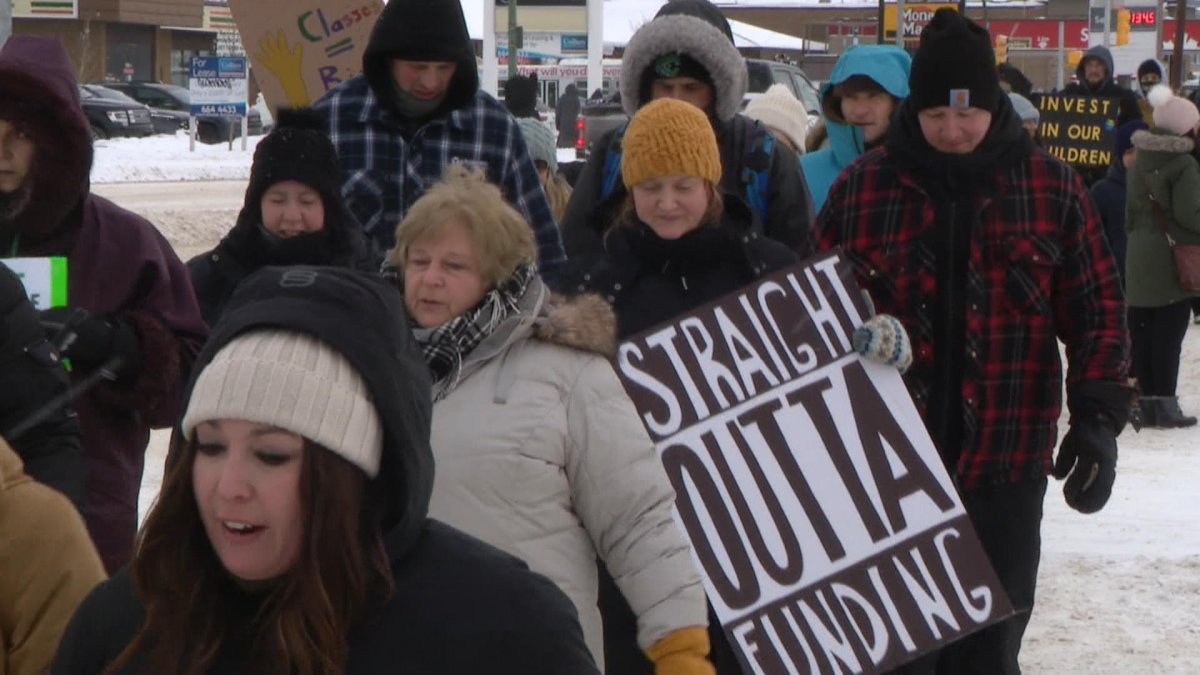Teachers in Saskatchewan have taken two days total to strike, but the bargaining deadlock between the Saskatchewan Teachers’ Federation and the provincial government hasn’t budged.

Saskatchewan Teachers’ Federation president Samantha Becotte said it was great to see support across the province Monday.
“The support from the public, and businesses, and parents and students was absolutely incredible,” Becotte said.

She said it was good to have support from people to call on the government to go back to the bargaining table and discuss classroom size and complexity, a topic that has been a point of contention for both sides.
Becotte said if the government continues to refuse to engage in this process, the STF will continue to “take the actions that are necessary.”
She wouldn’t give a timeline on the next steps or what they would look like, but said they’ve had conversations about what future actions could be.
“There has been no communication as of yet from the minister of education or the bargaining team.”
Teachers picketed Monday, but for some school divisions in the province, students weren’t expected in the classroom with the day being labelled a PD/planning day.
Becotte said there isn’t a perfect day for a strike, noting there will always be a disruption with these actions.

The STF and the government of Saskatchewan have been butting heads over a new bargaining agreement for several months now, with neither side willing to budge.
The STF made its asking package highlights public, with a salary ask of a two per cent increase annually plus the consumer price index average annual rate in Saskatchewan for each of the next four years.
A proposal around classroom size and complexity — a point the provincial government has said it is not willing to budge on — is asking for an evidence-based plan to address the increase in students, the increase in complex needs and the lack of resources to support learning.
Education Minister Jeremy Cockrill said issues around class sizes are best dealt with by local school divisions as each division is likely to have its own issues.
- Posters promoting ‘Steal From Loblaws Day’ are circulating. How did we get here?
- Solar eclipse eye damage: More than 160 cases reported in Ontario, Quebec
- Video shows Ontario police sharing Trudeau’s location with protester, investigation launched
- Is $10/day child-care at risk of ‘derailment’? Report spurs questions
“That is a line in the sand for government that we’re not going to be moving on,” Cockrill said last week.
He claimed that what the teachers are asking for is taking that decision away from school divisions.
“We have 27 locally elected school boards for a reason. If we’re going to put management issues like classroom size and complexity in a bargaining agreement, why have school boards?”
Cockrill admitted that there were challenges in classrooms across the province but said there needs to be local school board autonomy.
The government of Saskatchewan sent a statement Monday saying it was disappointed with the STF’s job action.
“The Government Trustee Bargaining Committee (GTBC) has put forward a fair deal for teachers with a 7 per cent raise over three years, ensuring Saskatchewan teachers remain paid above the Western Canadian Average. The GTBC remains at the table, ready to discuss competitive salary and benefits but cannot negotiate without the STF at the table as well,” the government statement said.

Michelle Prytula, an associate professor at Johnson Shoyama Graduate School of Public Policy, said the class size and composition issue in schools has been a topic of discussion since before the pandemic, but said those talks stopped when COVID-19 hit.
“I know there was some committee work done as well, but the teachers at that time weren’t necessarily as involved in that,” Prytula said.
She said both sides recognize that class size and complexity is a problem, they are just at odds on how to address it.
In terms of whether she feels this is effective job action, Prytula said it’s important for people to be able to voice their concerns.
“Considering that it’s an election year, it’s also quite effective to be putting that pressure.”
She pointed to the advance notice the STF has been giving when announcing these one-day strikes, saying it was a respectful way to inform parents and let them know that they need to make arrangements for their kids.
“Sometimes it has its toll on families.”
On Cockrill’s comment about class size and complexity being best dealt with by school boards, Prytula said it was a difficult issue and that multiple policies have come into the mix.
“Way back in 2006 when school boards were amalgamated so that we’d have fewer school boards, the numbers that we have today, there was a decision a few years later, I think in 2009, that school trustees or boards would not have the privilege of setting their own mill rates.”
She said that change has made it difficult for school boards to take on an issue like class size and complexity.
“It’s one thing to have the responsibility to do something, but if you don’t have the authority to collect revenues in order to properly do that, it’s pretty tough.”
Prytula said class size and composition would be a difficult issue for the Saskatchewan government to take on provincially, as it’s a contextual issue.
“Every community, every school board has a unique set of circumstances, whether it’s geographical, whether it’s learning issues, whether it’s the number of teachers they can hire, whether it’s the number of subjects they can teach.”
She said she feels the negotiations are happening where they need to at the moment, adding that school boards don’t have the right to set taxation, so teachers need to negotiate directly with the government for any meaningful change.




Comments